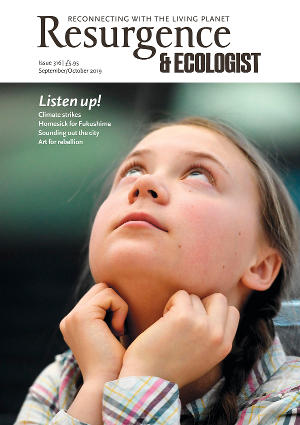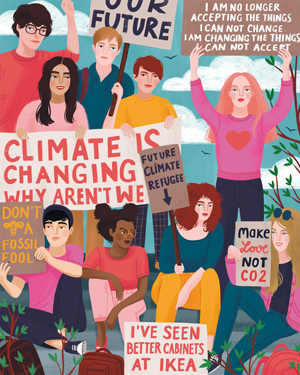Strike for the planet - our children need us more than ever before, writes Jonathan Neale.
I have been a climate activist for 15 years. In that time the leaders of the world have betrayed all life on Earth. They told us they would control greenhouse-gas emissions. Instead, global emissions have increased at breakneck speed. I have tried to put on a brave face, but there have been many nights after the meetings and the marches, alone in the dark, when I despaired.
Now the school climate strikes have made hope possible. And they have asked everyone to join them on their next strike on Friday 20 September.
The school climate strikes are something new. They are global strikes, which is new, and led by children, which is new. They have immense moral authority. The children who will have to inhabit the world we are giving them are calling upon us to act. And they are calling on everyone to be radical – to go all the way to find solutions that will work.
The school strikes have moral authority, too, because they are collective actions. Civil disobedience, marches, meetings, petitions and occupations are the actions of minorities who leave their daily lives to come together with others of like mind. The strikes do not bring out all the children in any school, but that is their goal.
In striking, the children are defying the authority that has controlled their lives since they were six years old or even younger.
The children’s strikes have been global, collective, defiant, aiming for majorities and aiming to go all the way. These are the qualities we will need in a movement that can save life on Earth.
The powerful, the rich and the leaders of the Earth have not just failed to act. They have resisted action. We know now that we will have to elect radical governments to replace them. Given what those governments will be up against, they will need majorities prepared for mass defiance of the corporations.
That is why the school strikers are so inspiring. They show a possible future.
So, yes, please join them, us, on 20 September. In your own way, in your own circumstances, try to replicate their strengths. Try to persuade as many people as you can from your place of work to join you. Be polite to management, and inform them beforehand, and know that it is defiance. Some people worry that political strikes like this one are illegal. That is formally true. But we have the immense moral authority of the children and the future of life on Earth on our side this time. No employer is going to discipline you.
The key to persuading others to act is finding other people to work with you. Tomorrow, try to find one or two other people at work who will do that. Don’t approach them with a plan. Sit and talk with them in the canteen, in a pub, in a coffee bar. Work out together what to do. Use lots of private text messages – the young people do. But have meetings. Above all, have conversations. The more the talk, the more the buzz, the more the excitement, the more going out together will seem possible to the nervous and the doubtful.
These are first steps on 20 September. The school strikes started with one 16-year-old sitting outside the Swedish parliament, and built steadily. If you get five people to leave work with you this time, you will get 20 or 30 next time. If we get a million adults this time, we will get 5 million globally the next time.
You could say to people that they would leave work without a second thought if their mother were taken to hospital. Well, this time Mother Earth is on fire and all her children are in danger.
Students stand together - Bangladesh hears the call, writes 19-year-old Mahmudul Hassan
Initially, I followed this movement on Twitter and Facebook. As a global citizen, I was desperately concerned about how the climate crisis could be stopped. Then I found Greta Thunberg and the global strike. Then I started striking in Bangladesh. Climate strikes take place every Friday in 15 cities in Bangladesh.
What has been the reaction from my parents and teachers? Umm! Frankly speaking, they were not interested. So, when I started striking alone for the climate issue, they were like, “Seriously? You are going to change the world by standing alone with placard?” But now we are doing so!
Other students don’t take the issue seriously. They say there are so many other problems, so why focus on the climate? They don’t understand how important this issue is.
On 20 September we definitely plan to go on strike. When I am alone, the possibilities shrink, so here we work with an organisation called Brighters Society. From here, young people are working on a number of things. We first try to convince more and more of our fellows and friends so that we can stand together and shout, “This is a climate emergency!” We have also been trying to arrange campaigns in schools. When we have school students and teachers with us, our voice is raised much more. So we are trying to get them involved.
In each and every school in the cities where we have already been on strike, we are trying to elect some school coordinators. These good people will mobilise their classmates to go on strike.
Before 20 September, we are planning to organise a national strike in some of the big cities, including the capital. Through this we will be able to draw the attention of the authorities and government of Bangladesh so that they can declare a climate emergency sooner.
We already have some organisers in a few cities who strike every Friday. Now we are on a mission to increase their number so that we can have a great crowd for every strike!
Along with increasing the number of organisers and volunteers, we are trying to reach more and more cities in Bangladesh with this issue. The more places we strike, the more attention we draw to the climate emergency
Parents step up
Inspired by the global youth strikes, Parents For Future has grown over the last six months in over 20 countries. In the UK, we are working closely with the strike organisers UK Student Climate Network, and asking adults to add their voice to the young people’s calls for urgent, meaningful, political-level action to address climate change. We also suggest weekly actions adults can take to use their power as economic actors, voters and workers to keep up the pressure for change and to start to make changes in their own lives.
We are calling on all adults who care about the planet future generations will inherit to join the combined general strike and youth strike on 20 September. Parents For Future will be organising cycle actions around the world and planning is under way for other creative actions in the UK.








